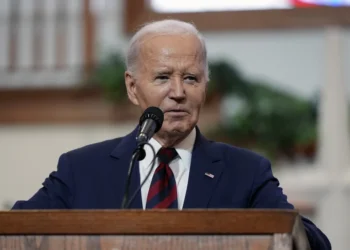No country was more surprised than Israel by President Donald Trump‘s May 6 revelation that the United States had reached a truce with Yemen’s Houthi rebels.
During an Oval Office meeting with Canadian Prime Minister Mark Carney, Trump asserted that the Houthis “don’t want to fight anymore.” He added, “we will stop the bombings. And they have capitulated. But more importantly, we will take their word.” Secretary of State Marco Rubio added, “this was always a freedom of navigation mission. These guys are a band of individuals with advanced weaponry that were threatening global shipping. And the job was to get that to stop.”
Responding to a reporter’s question, Trump denied there was a deal, claiming “they’ve said, please don’t bomb us anymore, and we’re not going to attack your ships,” citing a “very, very good source.” Shortly after Trump’s remarks, Oman’s foreign minister, revealing contacts with Washington and the Houthis, said Oman had facilitated a “cease-fire agreement” so that “in the future, neither side will target the other, including American vessels, in the Red Sea and Bab al-Mandab Strait, ensuring freedom of navigation and the smooth flow of international commercial shipping.”
The Houthis denied that they had capitulated, asserting the deal did not limit their military campaign against Israel. Indeed, even Oman’s statement appears to say the deal is between America and the Houthis, not covering other shipping in the Suez Canal-Red Sea maritime passage. Commercial shippers were skeptical.
Trump arrives in Saudi Arabia on Tuesday, with additional visits to Qatar and the United Arab Emirates, so questions surrounding the U.S.-Houthi detente will surely be a major topic. Twenty years of internal conflict in Yemen, continuing in today’s civil war, has been a major source of instability and danger across the Arabian Peninsula. The Arab oil-producing monarchies always recognized that Yemen’s domestic turmoil both affected them directly and provided Iran an excellent opportunity to gain influence in their backyard, thereby raising further threats. Although not on Trump’s itinerary, Israel will be watching closely, having suffered a Houthi missile strike against Ben Gurion airport two days before Trump’s truce announcement.
By financing, arming, and training the predominantly Shia Houthis, Tehran not only added another terrorist proxy like Hamas and Hezbollah to its “ring of fire” strategy against Israel, but also threatened its Arab adversaries via that strategy. By 2015, Iran’s role in Yemen’s “internal” conflict had grown so menacing that the Saudis, Emiratis, and others intervened directly against the Houthis. Although initially supportive, Barack Obama turned against the Saudi-Emirati campaign, bending to enormous international pressure against their efforts. Trump’s first administration was more supportive of its allies, but congressional and media pressure nonetheless led to reduced direct U.S. support. Former President Joe Biden effectively ended Washington’s aid for the Saudi war effort.
We should have understood better that the Houthis were not an oppressed minority suffering human-rights violations at the hands of other Arab states, but rather a proxy for Iran seeking to undermine their stability. In recent years, the Houthis launched numerous drone and missile attacks against Saudi Arabia and the UAE, targeting civil airports (including Abu Dhabi International Airport), desalination plants, and oil infrastructure. After the savage Oct. 7, 2023, Hamas assault on Israel, the Houthis played their role in the “ring of fire” strategy by closing the Red Sea to international shipping and periodically attacking Israel itself. All this was directly tied to the Iranian-backed war against Israel, not some isolated outburst by an unrelated terrorist group.
Without the ayatollahs, the Houthis would never have been able to threaten Red Sea shipping, including American warships in innocent passage. Biden’s administration did launch several attacks against Houthi targets post-Oct. 7, but the efforts were half-hearted. His unwillingness to shatter the maritime interdiction almost certainly stemmed from fear of offending Iran, and thereby dooming revival of the disastrous 2015 nuclear deal. Biden’s hesitation allowed the Houthis to continue their blockage and to threaten Israel. When Trump launched military action against the terrorists, it seemed Washington finally understood what was at stake.
REPUBLICANS ARE AFRAID TO DEFUND PLANNED PARENTHOOD
No longer. Trump’s Houthi truce has left Israel in the lurch at a critical time, with key decisions pending on whether, perhaps with direct U.S. involvement, Israel will finish off Iran’s nuclear weapons program. The ceasefire also appears linked to Trump envoy Steve Witkoff’s nuclear negotiations with Tehran, perhaps prompted by Witkoff. If so, this is a critical mistake. Opening the Red Sea passage was never simply a freedom-of-navigation exercise, certainly not in Iran’s eyes, and not when our Israel ally is under direct Houthi attack.
From its origins, the U.S. has fought for freedom of the seas, a vital American national interest. Thomas Jefferson proved our resolve when he launched the U.S. Navy against the Barbary pirates. He would not have suspended the campaign against the Houthis. Someone should tell Trump.

















